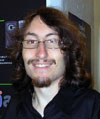Robert Murray: Cell Phones: Wayfinding assistive technology for the visually impaired
| Attachment | Size |
|---|---|
| 86.26 KB | |
| 70.59 KB |
 Robert Murray worked on assistive technology for the visually impaired in the department of Computer Engineering under Professor Roberto Manduchi at the University of California, Santa Cruz during the SURF-IT program of Summer 2006. The project focused on developing an existing wayfinding technology device that had been work on by Roberto Manduchi and graduate students to include new alternatives for audible feedback. The device consisted of a cell phone with a built in camera and software developed by project contributors designed to capture images of the environment, find uniquely designed color targets in the surroundings, and respond to the user by giving useful information about the target's location.
Robert Murray worked on assistive technology for the visually impaired in the department of Computer Engineering under Professor Roberto Manduchi at the University of California, Santa Cruz during the SURF-IT program of Summer 2006. The project focused on developing an existing wayfinding technology device that had been work on by Roberto Manduchi and graduate students to include new alternatives for audible feedback. The device consisted of a cell phone with a built in camera and software developed by project contributors designed to capture images of the environment, find uniquely designed color targets in the surroundings, and respond to the user by giving useful information about the target's location.
During work on the project, it was recognized that the current feedback model, a simple varied pitch tonal response based on location in one of three image regions, was insufficient in providing useful information to the user. In response, Robert began investigation and development on alternatives including speech feedback and proximity based tonal response. As well, an issue of unresponsiveness was addressed and the possibility of using continuous tones was investigated. The result of the research was that the proximity based feedback, though still unresponsive due to a lack of resolution in regards to the continuous tone issue, was a far better feedback model and resolved issues of misguiding the user and loss of the target while wayfinding. Speech feedback was investigated, though no implementation was completed, and overall, it was resolved that TTS (Text to Speech) and speech response was too expensive to be utilized on a mobile platform at the time of research.
Future work hopes to resolve further issues with the wayfinding feedback models in place and possibly develop new, improved models. As well, further investigation into speech feedback is planned. Robert is planning to continue work on this and related projects with Roberto Manduchi during his senior year at the University of California, Santa Cruz as a Computer Science student completing his B.S.